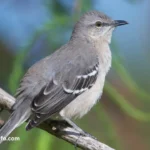Imagine a quiet night, the sky blanketed in deep indigo, and the air still except for one sound—a song so varied and mesmerizing that it could only come from a mockingbird. Mockingbirds are renowned for their ability to mimic the calls of other birds and even mechanical noises, but their behavior at night raises an intriguing question: are they nocturnal?
This curiosity isn’t just about birdwatchers wanting to understand their feathered neighbors better; it’s a quest to unlock the mysteries of nature’s evening performers. Understanding the habits of mockingbirds can reveal much about their behavioral adaptations, helping us appreciate why they sing long after the sun has set.
For those who enjoy peaceful evenings or have ever been surprised by the chirping melodies echoing under the moon, knowing whether mockingbirds are nocturnal can make these nighttime concerts even more meaningful.
In this article, we’ll delve into the cultural interpretations, the scientific perspective, and the reasons behind the mockingbird’s nighttime songs, answering once and for all whether these birds truly belong to the night or simply choose to sing when the world is asleep.

Contents [hide]
1. Cultural Interpretations of Nighttime Songs
In some Native American traditions, birds are often seen as spiritual messengers. Mockingbirds, known for their vocal prowess, were sometimes believed to be guides between the physical and spiritual worlds, especially when heard at night.
Their night songs could be interpreted as a way of connecting with ancestral spirits or signaling changes in one’s life.Southern folklore adds another layer, suggesting that when a mockingbird sings after dark, it could be a sign of upcoming news or changes.
While some see it as a positive omen bringing good luck, others perceive it as a warning or a sign that one should be attentive to messages from the universe.
2. Natural Behavior and Adaptation
Mockingbirds are not typically classified as nocturnal birds, but they do engage in nocturnal singing. This behavior is especially common during breeding season, when male mockingbirds sing at night to attract mates or assert their territory.
The reason behind their choice to sing at night is primarily territorial defense—by singing when other birds are silent, they make their presence more pronounced.
Another reason for their nighttime singing could be environmental factors. Urban areas with abundant light can trick birds into perceiving it as daylight, leading them to sing. These adaptations highlight the mockingbird’s remarkable resilience and ability to thrive in various environments.

3. Psychological Impact on Listeners
The song of a mockingbird at night can evoke a range of emotions in those who hear it. Some people find the sound soothing, as if nature itself is telling a bedtime story, while others may feel a sense of mystery or foreboding.
The emotional response often depends on personal experiences, with cognitive biases shaping whether one views the bird’s song as a peaceful backdrop or an interruption.
Cognitive bias also plays a role in how people interpret nocturnal bird songs. For example, if someone has heard a mockingbird before a significant event in their life, they may link the bird’s song to premonitions or signs of change, reinforcing its symbolic value.
4. Scientific Perspective on Night Singing
While cultural and emotional interpretations are fascinating, what does science say? Research indicates that male mockingbirds sing at night to amplify their courtship signals and establish territory. This behavior is more common in unmated males, suggesting that their singing is an effort to stand out in the avian dating world.
Nighttime is quieter, so their songs carry further, making it an ideal time for attracting potential mates. The absence of daytime noise also helps their melodies resonate more effectively, demonstrating the bird’s strategic approach to survival and reproduction. Despite these findings, there is no evidence that these nighttime performances hold any supernatural significance.
5. Unique Adaptations of Mockingbirds
Mockingbirds have evolved to mimic not only other birds but also other sounds in their environment. This remarkable vocal versatility may play a role in why they sing at night. By imitating different sounds, they can communicate a sense of dominance and establish a repertoire that impresses potential mates.
Their keen adaptation skills are part of what makes them so intriguing. Living in urban areas has further pushed these birds to develop behaviors that allow them to coexist with humans. The streetlights and city noise do not deter them; instead, they incorporate these elements into their survival strategies, solidifying their role as nature’s ultimate night singers.
Conclusion
Mockingbirds are not strictly nocturnal, but their habit of singing at night has deep cultural significance, practical reasons related to mating and territory, and emotional impacts on those who hear them.
While science sheds light on their behavior, cultural and personal interpretations keep their nighttime songs shrouded in an aura of mystery. Understanding these multi-faceted reasons behind why mockingbirds sing at night reminds us of nature’s blend of practicality and wonder.
So, next time you hear the melodious call of a mockingbird under the moon, know that it’s more than just a song. It’s a story of survival, adaptation, and perhaps even a whisper of nature’s secrets, urging you to pause and listen.
FAQs
1. Are mockingbirds nocturnal birds?
Mockingbirds are not nocturnal but may sing at night, especially during breeding seasons.
2. Why do mockingbirds sing at night?
They sing at night primarily to attract mates or to mark their territory, especially when it’s quieter, allowing their songs to carry further.
3. Do mockingbirds only sing at night in urban areas?
Mockingbirds are more likely to sing at night in areas with artificial light, such as cities.
4. Is nighttime singing common for all birds?
No, only a few birds sing at night, with mockingbirds being one of the most notable examples.
5. Do female mockingbirds sing at night?
Generally, it is the male mockingbird that sings, especially when trying to attract a mate or defend its territory.
6. What cultural beliefs are associated with nighttime singing?
In some cultures, a mockingbird’s song at night is seen as a message from the spirit world or a sign of change.








